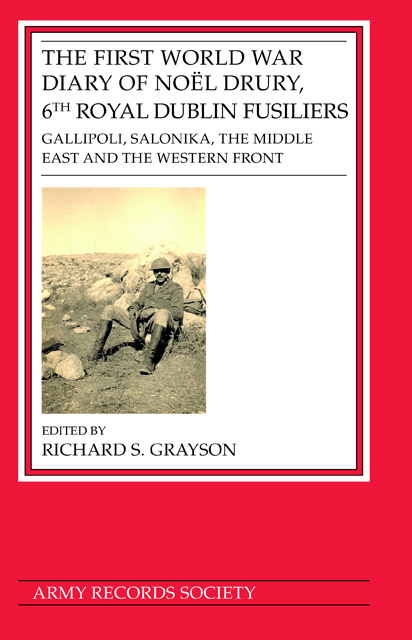 First World War Diary of Noël Drury, 6th Royal Dublin Fusiliers
First World War Diary of Noël Drury, 6th Royal Dublin Fusiliers Book contents
- Frontmatter
- Miscellaneous Frontmatter
- Contents
- List of Illustrations
- Acknowledgements
- List of Abbreviations
- Introduction
- 1 Volunteering and Training, September 1914–July 1915
- 2 The Voyage to the Dardanelles, July–August 1915
- 3 Gallipoli: Landing at Suvla Bay and the Next Ten Days, 7–17 August 1915
- 4 Gallipoli: Digging In, 18 August–October
- 5 The Serbian Front and the Battle of Kosturino, October–December 1915
- 6 The Salonika Front and Hospital, December 1915–September 1917
- 7 Egypt and Palestine, September–December 1917
- 8 Defending Jerusalem and the Battle of Tell ‘Asur, December 1917–July 1918
- 9 France, July–11 November 1918
- 10 Armistice, 12 November 1918– 11 March 1919
- Appendix 1 6th Royal Dublin Fusiliers leaving home for service overseas, 10 July 1915
- Appendix 2 The Effects of the Gallipoli Campaign on the 6th Royal Dublin Fusiliers
- Appendix 3 Officers of the 6th Royal Dublin Fusiliers at Hastière-sur-Meuse, Nov 1918
- Biographies
- Bibliography
- Index
10 - Armistice, 12 November 1918– 11 March 1919
Published online by Cambridge University Press: 14 June 2023
- Frontmatter
- Miscellaneous Frontmatter
- Contents
- List of Illustrations
- Acknowledgements
- List of Abbreviations
- Introduction
- 1 Volunteering and Training, September 1914–July 1915
- 2 The Voyage to the Dardanelles, July–August 1915
- 3 Gallipoli: Landing at Suvla Bay and the Next Ten Days, 7–17 August 1915
- 4 Gallipoli: Digging In, 18 August–October
- 5 The Serbian Front and the Battle of Kosturino, October–December 1915
- 6 The Salonika Front and Hospital, December 1915–September 1917
- 7 Egypt and Palestine, September–December 1917
- 8 Defending Jerusalem and the Battle of Tell ‘Asur, December 1917–July 1918
- 9 France, July–11 November 1918
- 10 Armistice, 12 November 1918– 11 March 1919
- Appendix 1 6th Royal Dublin Fusiliers leaving home for service overseas, 10 July 1915
- Appendix 2 The Effects of the Gallipoli Campaign on the 6th Royal Dublin Fusiliers
- Appendix 3 Officers of the 6th Royal Dublin Fusiliers at Hastière-sur-Meuse, Nov 1918
- Biographies
- Bibliography
- Index
Summary
On the day after the armistice the 6th Royal Dublin Fusiliers moved a short distance to Avesnes-sur-Helpe. From here, they expected that they would eventually push on into Germany as part of the Army of Occupation. However, they would get no more than 80 miles towards Germany. Their final location from December was the Belgian town of Jemelle, about 70 miles short of the German border. During their progress towards Jemelle the battalion took part in parades and also carried out road repairs, finding that there were delay action mines still causing damage. Drury encountered damage to property caused by Germans and ‘wished there were no armistice and that we could get the dirty hounds with the bayonet.’ However, he did manage to get temporary use of an abandoned Renault car with German number plates, and he used that to see the countryside. Encounters with the local population were not always positive. In Hemptinne in Belgium, Drury noted: ‘The people are unpleasant, and I suppose treat us as they did the Bosch – as interlopers.’ At Hastiere, Drury found a ‘tremendous display of Union Jacks’. These, it seemed, had been bought from Germans who had told the Belgians ‘that the British were awful savages and would beat and burn all before them if each house did not show a flag’. The Germans had ‘browbeat the people into buying an enormous stock of flags which were brand new and made in Germany specially for the occasion!’ By this time, of the thirty-two officers in the battalion, Drury was one of only two who had been in the original unit, the other being Captain G.Y. Loveband (see Appendix 3).
Drury had leave to Paris in the early half of December. It was to be his last piece of tourism. After spending part of Christmas Day with the people with whom he was billeted, Drury noted with joy that the battalion was to be presented with colours and much preparation went into practising for the ceremony. However, the colours were not awarded (for reasons which are unclear) and, when the battalion learned of the city of Dublin accepting enemy guns captured by New Zealanders, this all added to a feeling of ‘the slights which were constantly being put on us’.
- Type
- Chapter
- Information
- First World War Diary of Noël Drury, 6th Royal Dublin FusiliersGallipoli, Salonika, the Middle East and the Western Front, pp. 282 - 297Publisher: Boydell & BrewerPrint publication year: 2022


